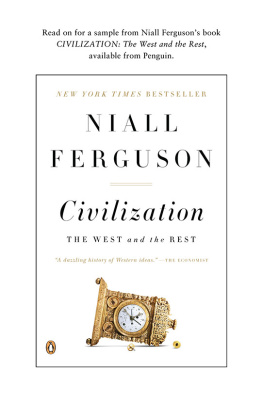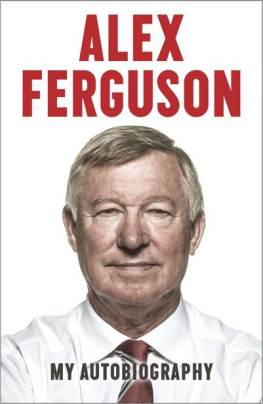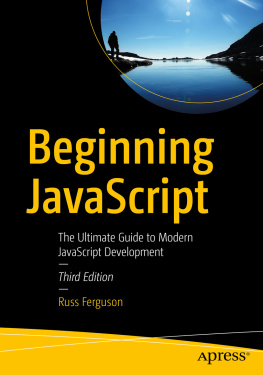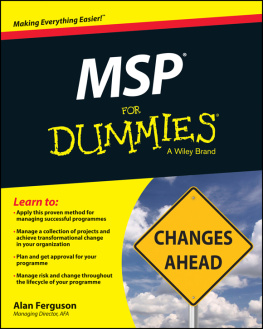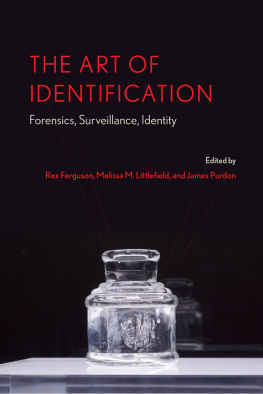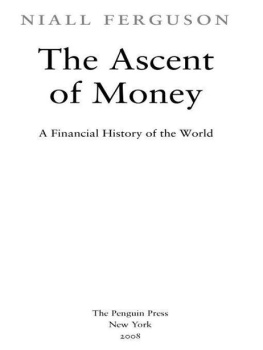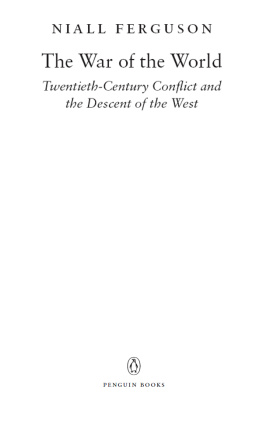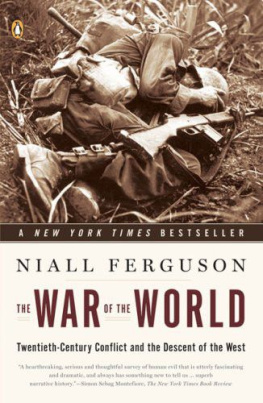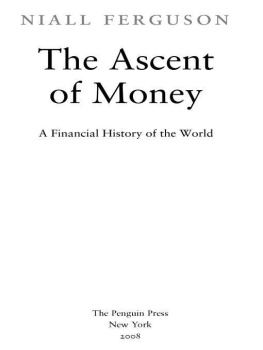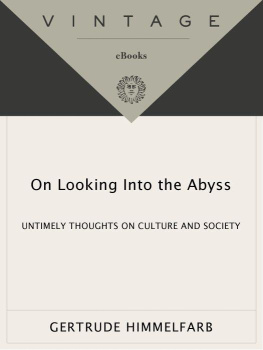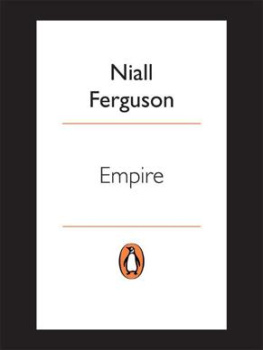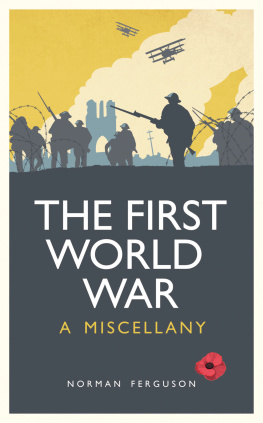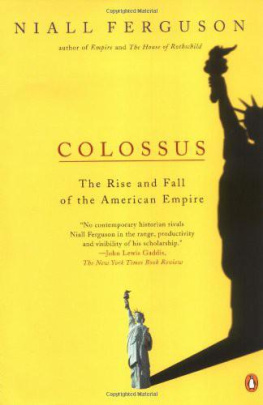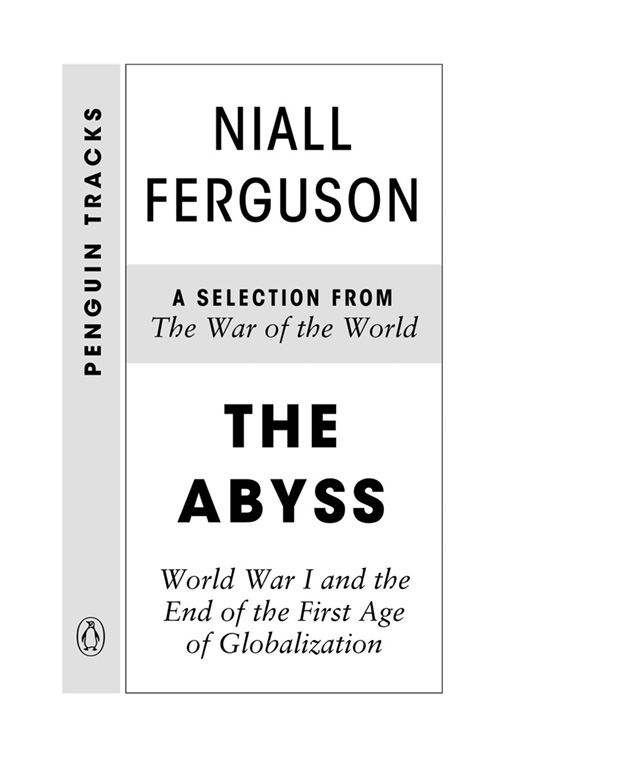CONTENTS
THE ABYSS
World War I and the End of the First Age of Globalization
EXTRA!
PENGUIN TRACKS
THE ABYSS
World War I and the End of the First Age of Globalization
NIALL FERGUSON is one of the worlds most renowned historians. He is the author of Paper and Iron, The House of Rothschild, The Pity of War, The Cash Nexus, Empire, Colossus, The War of the World, The Ascent of Money, High Financier, and Civilization. He is the Laurence A. Tisch Professor of History at Harvard University, a Senior Research Fellow of Jesus College, Oxford, and Senior Research Fellow of the Hoover Institution, Stanford University. He is also a regular contributor to Newsweek and Bloomberg television.

Also by
Niall Ferguson
* * * *
CIVILIZATION:
The West and the Rest
HIGH FINANCIER:
The Lives and Time of Siegmund Warburg
THE ASCENT OF MONEY:
A Financial History of the World
THE WAR OF THE WORLD
Twentieth-Century Conflict and the Descent of the West
COLOSSUS:
The Rise and Fall of the American Empire
EMPIRE:
The Rise and Demise of the British World Order and the Lessons for Global Power
THE CASH NEXUS:
Money and Power in the Modern World, 17002000
THE PITY OF WAR:
Explaining World War I
THE HOUSE OF ROTHSCHILD:
Volume 1: Moneys Prophets, 17981848
Volume 2: The Worlds Banker, 18481999
PAPER AND IRON:
Hamburg Business and German Politics in the Era of Inflation, 18971927
ABOUT THE BOOK
The first quarter of Niall Fergusons classic 2006 book The War of the World stands on its own as one of the most thrilling short histories of World War I ever written. Now, on the cusp of the 100th anniversary of that war, Penguin Tracks is offering this section as an original e-book, with a new preface by the author.
Most books about World War I represent its causes as diplomatic, its course as military, and its consequences as economic. This is a gross oversimplification. The most remarkable thing about the war, Niall Ferguson shows us, is how shockingly unexpected it was. The worst war in human history until that point came at a time when economic integration and technology seemed to be rendering war between the great powers impossible. The wars deeper causes were obvious only in retrospect. Its course, after the opening offensives, was unplanned. Its consequences were mostly unintended.
The Abyss is emphatically not a conventional military history, a book about battles and generals. World War I saw the birth of total war, in the sense that it was fought between societies as much as armies. It therefore needs to be understood in terms of the financial crises that it unleashed; the multinational empires that it destroyed; and the hateful ideas that it propagated.
A century after its outbreak, we can now see World War I as more than just four years of industrialized slaughter. It was the moment when the process of global integration went into reverse and the lethal forces of ethnic disintegration took over. Weaving together the economics of empire and the ideology of race, The Abyss is world history at its finest.
PENGUIN BOOKS
Published by the Penguin Group
Penguin Group (USA) Inc., 375 Hudson Street, New York, New York 10014, USA
Penguin Group (Canada), 90 Eglinton Avenue East, Suite 700, Toronto, Ontario M4P 2Y3, Canada (a division of Pearson Penguin Canada Inc.)
Penguin Books Ltd, 80 Strand, London WC2R 0RL, England
Penguin Ireland, 25 St Stephens Green, Dublin 2, Ireland (a division of Penguin Books Ltd)
Penguin Group (Australia), 707 Collins Street, Melbourne, Victoria 3008, Australia (a division of Pearson Australia Group Pty Ltd)
Penguin Books India Pvt Ltd, 11 Community Centre, Panchsheel Park, New Delhi 110 017, India
Penguin Group (NZ), 67 Apollo Drive, Rosedale, Auckland 0632, New Zealand (a division of Pearson New Zealand Ltd)
Penguin Books, Rosebank Office Park, 181 Jan Smuts Avenue, Parktown North 2193, South Africa
Penguin China, B7 Jaiming Center, 27 East Third Ring Road North, Chaoyang District, Beijing 100020, China
Penguin Books Ltd, Registered Offices:
80 Strand, London WC2R 0RL, England
First published Penguin Books 2012
Copyright Niall Ferguson, 2006, 2012
All rights reserved
The contents of this book first appeared in Niall Fergusons The War of the World (The Penguin Press, 2006; Penguin Books, 2007).
ISBN 978-1-101-61620-8 (ePub)
No part of this product may be reproduced, scanned, or distributed in any printed or electronic form without permission. Please do not participate in or encourage piracy of copyrighted materials in violation of the authors rights. Purchase only authorized editions.
While the author has made every effort to provide accurate telephone numbers, Internet addresses, and other contact information at the time of publication, neither the publisher nor the author assumes any responsibility for errors, or for changes that occur after publication. Further, publisher does not have any control over and does not assume any responsibility for author or third-party Web sites or their content.
Preface
The majority of books about World War I represent its causes as diplomatic, its course as military and its consequences as economic. This book is altogether different. It was originally written as a prehistory of World War II. These were in fact the first five chapters of a much larger study, The War of the World (2006). However, they can also be read in isolation as a postmortem for the first age of globalization.
Only one era in history remotely resembles our own in terms of the degree of international economic and social integration, and that is the period from around 1875 to 1914. World trade grew to an unprecedented volume. Capital flowed across borders as never before. In some countries, notably the United States, immigration attained heights that have yet to be matched. Moreover, unlike today, this was a time of political globalization, when a dozen empires accounted for astounding shares of the worlds territory, population and wealth. There was even a global monetary system of fixed exchange rates: the gold standard.
Then, as in our time, books were published that confidently asserted the obsolescence of war. With the benefit of hindsight, historians have constructed elaborate narratives, tracing the origins of the war back into the nineteenth century. Few contemporaries were conscious that this was the direction of history. On the contrary, even the best-informed people in Europe were surprised by the events of the summer of 1914. At the time, the probability of such a conflagration had appeared to be falling rather than rising. Recent experience suggested that an assassination in the Balkans or even a war there was not likely to produce a full-scale war involving all the great powers. It had been almost exactly a century since the last such conflagration. Waterloo was beyond living memory.
Part of my purpose, then, was to show the unexpectedness of war to liberate the reader from the teleological chains of causation that retrospectively lead from the unification of Germany or the Anglo-German naval arms race or even the Balkan wars to the infamous guns of August. For I believe it is important for us to understand the suddenness and speed with which an integrated world can disintegrate.

